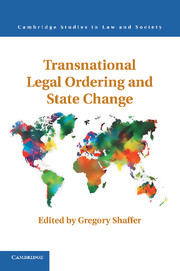Crossref Citations
This Book has been
cited by the following publications. This list is generated based on data provided by Crossref.
Jones, Trevor
and
Newburn, Tim
2013.
Policy convergence, politics and comparative penal reform: Sex offender notification schemes in the USA and UK.
Punishment & Society,
Vol. 15,
Issue. 5,
p.
439.
Sullivan, Gavin
2014.
Transnational Legal Assemblages and Global Security Law: Topologies and Temporalities of the List.
Transnational Legal Theory,
Vol. 5,
Issue. 1,
p.
81.
Morgan, Bronwen
2015.
The Handbook of Law and Society.
p.
150.
Shaffer, Gregory
2016.
The New Legal Realism.
p.
145.
Farrell, Henry
and
Newman, Abraham
2016.
The new interdependence approach: theoretical development and empirical demonstration.
Review of International Political Economy,
Vol. 23,
Issue. 5,
p.
713.
Heyvaert, Veerle
2018.
Transnational Environmental Regulation and Governance.
Londras, Fiona de
2018.
Politicisation, Law and Rights in the Transnational Counter-Terrorism Space: Indications from the Regulation of Foreign Terrorist Fighters.
European Review of International Studies,
Vol. 5,
Issue. 3,
p.
115.
Ofer, Nogah
2019.
Implementation of the Non-Punishment Principle in England: Why Are Victims of Trafficking Not Benefiting from the Protection from Prosecution Provided by International Law?.
Journal of Human Rights Practice,
Vol. 11,
Issue. 3,
p.
486.
Massoud, Mark Fathi
2019.
The Legal Process and the Promise of Justice.
p.
314.
Kulovesi, Kati
Mehling, Michael
and
Morgera, Elisa
2019.
Global Environmental Law: Context and Theory, Challenge and Promise.
Transnational Environmental Law,
Vol. 8,
Issue. 3,
p.
405.
Greenspan, Rosann
Aviram, Hadar
and
Simon, Jonathan
2019.
The Legal Process and the Promise of Justice.
Levi, Ron
and
Sendroiu, Ioana
2020.
Transnational Legal Ordering of Criminal Justice.
p.
333.
Penca, Jerneja
2020.
Transnational environmental regulation and governance: Purpose, strategies and principles, VeerleHeyvaertCambridge University Press, Cambridge, United Kingdom, 2019. 312 pp. $110.00 (cloth).
Governance,
Vol. 33,
Issue. 2,
p.
453.
Pavone, Tommaso
2020.
Lawyers, judges, and the obstinate state: The French case and an agenda for comparative politics.
French Politics,
Vol. 18,
Issue. 4,
p.
416.
Block-Lieb, Susan
2022.
Global Scripts in Transnational Legal Orders and Governance.
Annual Review of Law and Social Science,
Vol. 18,
Issue. 1,
p.
81.
Marcacci, Antonio
2023.
Transnational Securities Regulation.
Vol. 3,
Issue. ,
p.
1.
Fernandes, Magali Favaretto Prieto
2023.
International Economic Law.
p.
33.





